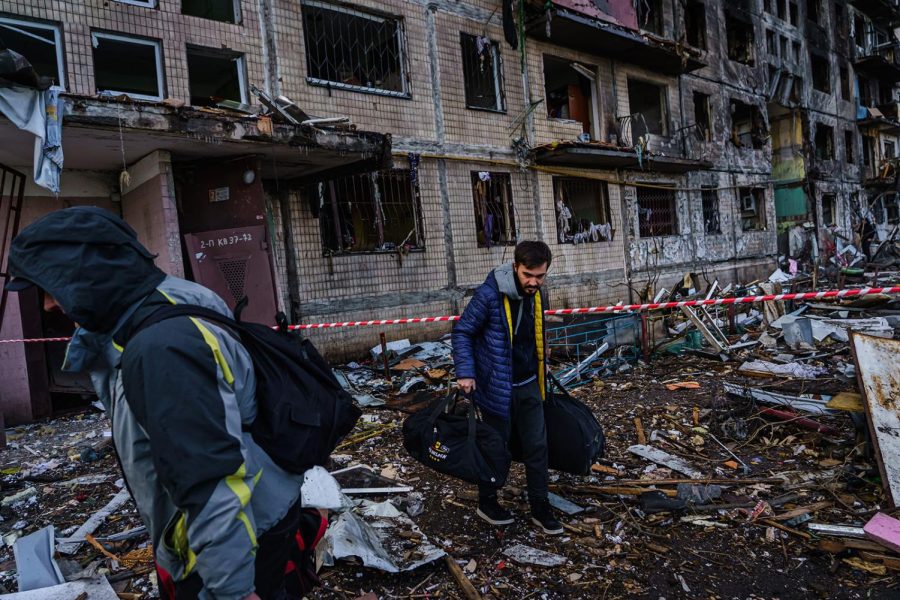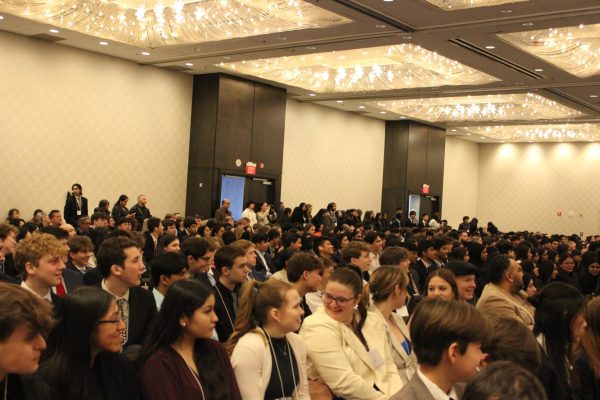Humanitarian crisis in Ukraine continues, affecting economies throughout the world
As countries place sanctions on Russia, the effects can be felt in the United States
Marcus Yam / Los Angeles Times / TNS
Residents carry bags out of an apartment building damaged by a Russian strike in suburban Kyiv, Ukraine on Monday, March 14, 2022.
March 15, 2022
The humanitarian crisis in Ukraine continues as Russia commits possible war crimes in attempts to gain control over major Ukrainian cities. Inflation on energy and oil continues to heighten, per President Joe Biden’s new announcement.
There have been ceasefires in Kyiv, Kharkiv, Mariupol, and Sumy to let civilians evacuate before Russia increases air strike pressure on them. Russian troops are increasing their attack on Irpin, which is 26 kilometers from Ukraine’s capital, Kyiv.
Vladimir Putin, Russia’s president, proposed evacuation routes for Ukrainians, but the routes lead to Russia and Belarus. Ukrainian officials called Putin’s offer propaganda, and believe the offer did not come from humanitarian concerns.
Ukrainian president Volodymyr Zelenskyy has also repeatedly asked NATO to create a no-fly zone in Ukraine. This would allow NATO planes to be sent into Ukrainian airspace to shoot Russian planes down.
NATO has denied the request, as an act like that would create direct conflict with Russia, risking a major war. Biden has made it clear he does not want the U.S. in conflict with Russia.
Amid the crisis, there have been calls for the International Criminal Court (ICC) to charge Putin with possible war crimes he may have committed. The United Nations have recorded at least 227 civilian deaths and 525 injured persons.
Russian soldiers have also appeared to be targeting civilians. On Mar. 6, eight unarmed Ukrainian civilians gathered near a bridge in Irpin were killed while attempting to flee to safety.
“A family died in front of my eyes. Two small children and two adults died,” said Oleksandr Markushyn, Irpin’s mayor, in a statement.
On Mar. 7, Zelenskyy said his country will have to “rebuild everything,” following reports of Russian forces firing on a bread factory, killing 13 people, and destroying a 160-year-old church. A maternity and children’s hospital was also hit, injuring seventeen and killing three.
In the United States, the economy has started to experience the effects from the war. Due to new sanctions banning Russian oil and energy imports, gas prices will rise even more than they did during the COVID-19 pandemic.
“Putin’s war is already hurting American families at the gas pump,” said Biden. “Since Putin began his military build-up at Ukrainian borders…the price of gas at the pump in America went up 75 cents…I’m going to do everything I can to minimize Putin’s price hike here at home.”
In February, oil was selling for $90 a barrel, but prices went up to $130. Energy analysts warn Americans gasoline prices could push past $5 a gallon.
Sanctions on Russia are also causing significant damage to the Russian economy, as their currency has declined in value. One ruble now holds a face value less than one American penny.
In the midst of the war, countries have stepped up to help Ukrainian citizens seeking refuge. Poland has already taken in about 1 million refugees, and neighboring countries have opened up their borders as well.
While the crisis remains, Ukrainian troops stand stronger than anyone would have expected. Help from neighboring countries also gives some hope against the darkness reigning over Europe.






















